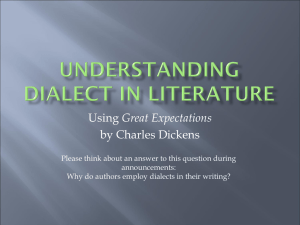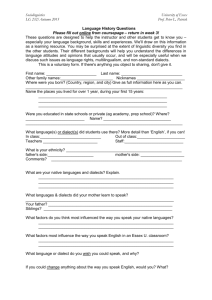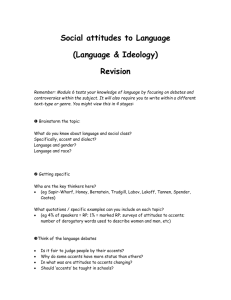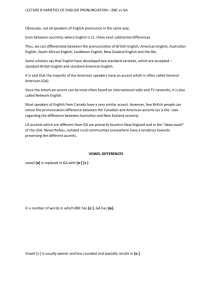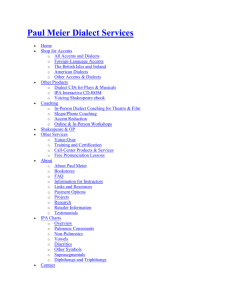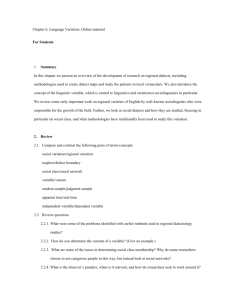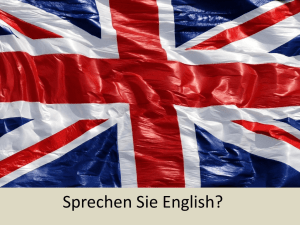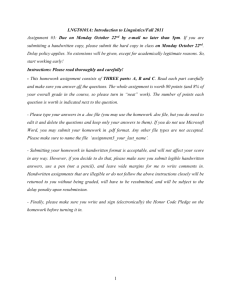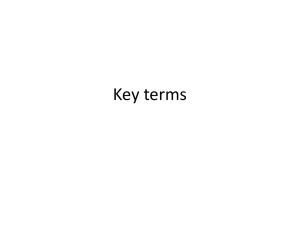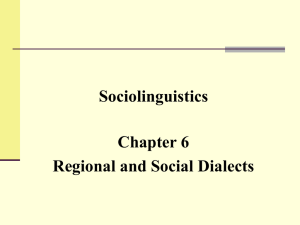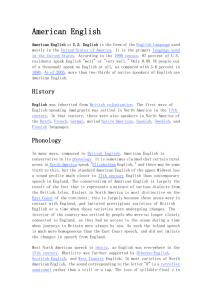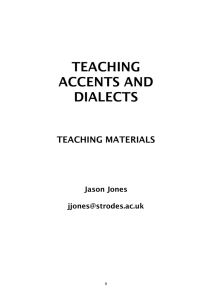Queen`s English = Posh Dialect = Received Pronunciation
advertisement
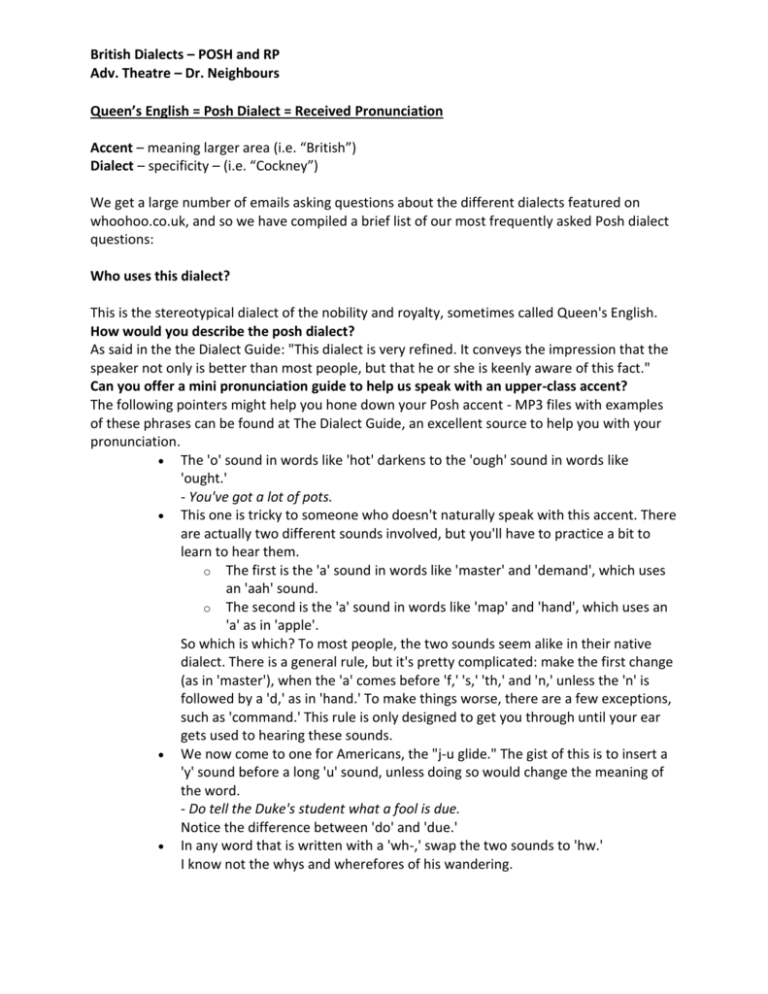
British Dialects – POSH and RP Adv. Theatre – Dr. Neighbours Queen’s English = Posh Dialect = Received Pronunciation Accent – meaning larger area (i.e. “British”) Dialect – specificity – (i.e. “Cockney”) We get a large number of emails asking questions about the different dialects featured on whoohoo.co.uk, and so we have compiled a brief list of our most frequently asked Posh dialect questions: Who uses this dialect? This is the stereotypical dialect of the nobility and royalty, sometimes called Queen's English. How would you describe the posh dialect? As said in the the Dialect Guide: "This dialect is very refined. It conveys the impression that the speaker not only is better than most people, but that he or she is keenly aware of this fact." Can you offer a mini pronunciation guide to help us speak with an upper-class accent? The following pointers might help you hone down your Posh accent - MP3 files with examples of these phrases can be found at The Dialect Guide, an excellent source to help you with your pronunciation. The 'o' sound in words like 'hot' darkens to the 'ough' sound in words like 'ought.' - You've got a lot of pots. This one is tricky to someone who doesn't naturally speak with this accent. There are actually two different sounds involved, but you'll have to practice a bit to learn to hear them. o The first is the 'a' sound in words like 'master' and 'demand', which uses an 'aah' sound. o The second is the 'a' sound in words like 'map' and 'hand', which uses an 'a' as in 'apple'. So which is which? To most people, the two sounds seem alike in their native dialect. There is a general rule, but it's pretty complicated: make the first change (as in 'master'), when the 'a' comes before 'f,' 's,' 'th,' and 'n,' unless the 'n' is followed by a 'd,' as in 'hand.' To make things worse, there are a few exceptions, such as 'command.' This rule is only designed to get you through until your ear gets used to hearing these sounds. We now come to one for Americans, the "j-u glide." The gist of this is to insert a 'y' sound before a long 'u' sound, unless doing so would change the meaning of the word. - Do tell the Duke's student what a fool is due. Notice the difference between 'do' and 'due.' In any word that is written with a 'wh-,' swap the two sounds to 'hw.' I know not the whys and wherefores of his wandering. British Dialects – POSH and RP Adv. Theatre – Dr. Neighbours The vowels in this dialect are, as a rule, quite rounded. A - E - I - O - OO. The 'r' sound is dropped, unless followed by a vowel, in which case it is tapped. What does 'tapped' mean? Imagine that you are rolling the 'r.' Now do it only once. You may fake it if you must by doing a very light 'd' sound. - The terrible work goes on. Take the 'a' sound in words like 'fall' as far as possible. You cannot overdo this one! - He called at the hall every fall. Whenever you encounter the sounds 't' and 'l' together, as in 'rattle,' pronounce them both at once, producing a crisp, clear sound. - Little bottle. Both the long 'oo' sound (as in 'fool') and the short 'oo' sound (as in 'book') are stretched out. - Fool, you play by the book. The “TRAP-BATH” Split THE #1 thing Americans must master with British accents (and most often mess up) – THE TRAP-BATH SPLIT. This is what is found in “Received Pronunciation.” In most American accents, we pronounce trap, cat, and bad with roughly the same vowel as ask, can’t and laugh. This is what we refer to as the short-a sound. In many British accents, however, these are two separate vowels: The first group of words (i.e.trap) are pronounced with a short-a, (IPA æ) as in America ; but the second group (i.e. bath) is pronounced with a broad-a, IPA ɑ: (i.e. “ah“). Hence the Trap-Bath Split. Americans would say The cat took a bath so that cat and bath are pronounced with the same vowel. For many British people, however, only cat would be pronounced with this vowel; bath is pronounced with the same broad-a vowel as father or palm. There are no easy rules for which words fall into these two categories. For example, the word chant is pronounced with broad-a in Standard British English (IPA ɑ: or chahnt), but the word ant is pronounced with the short-a. As Actors: Careful you show your American-ism on last or can’t. As an actor, make sure the British dialect you are doing actually has the split. A number of British accents, contrary to popular belief, do not feature the split. And the split is used in accents outside the United Kingdom. For handy reference, then, this is a list of accents with the split and those without: Accents with the Trap-Bath Split: Received Pronunciation (Standard British) Cockney/London English British Dialects – POSH and RP Adv. Theatre – Dr. Neighbours Australian English* New Zealand English South African English Old-fashioned New England Accent (Down East) Accents without the Trap-Bath Split: Nearly all American and Canadian Accents Scottish English Northern English Accents Caribbean English (usually) There are some dialect regions where it’s mixed. Some speakers have the split in these places, some don’t: Midlands English (Birmingham, etc.) Welsh English Irish English (depending on many factors) Boston English (still a feature in some very working-class dialects) If you’re playing a character who speaks with Received Pronunciation or of a character from the London area, always use the split. Any other region in England, do research that is as specific as possible. It can really vary in this day and age. RP is the safe dialect for actors!!! Received Pronunciation Pointers 1.) Understand which words generally fall into the Bath category. Here are the types of words that usually are pronounced with this broad-a: -aff: staff, chaff, etc. -aft: daft, after, draft, etc. -alf: half, calf, etc. -ample: example, sample, etc. -ance: dance, lance, etc. -anch: ranch, branch, etc. -ans: answer, etc. -ant: can’t, chant, advantage, etc. -aph: graph, etc. -as or -ass: ask, trespass, grass, etc -ath: bath, path, etc. -augh: laugh, etc. -aunt: aunt, etc. there are many individual exceptions to the list above. The important thing is to know where the broada tends to appear in British English, not to memorize every single word that is pronounced like this. 2.) If you’re having trouble mastering the split, circle every instance in your script where these kinds of words appear. 3.) Get your hands on a copy of the Longman Pronunciation Dictionary. This is an indispensable volume of British and American pronunciations edited by British linguist John C. Wells. For trap-bath words, it clearly marks whether British English pronounces these words with a æ (trap) or ɑ: (bath). (You can also use dictionary.com).
